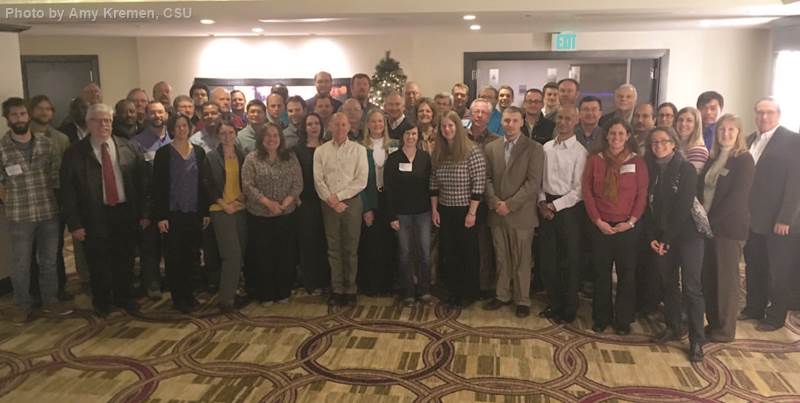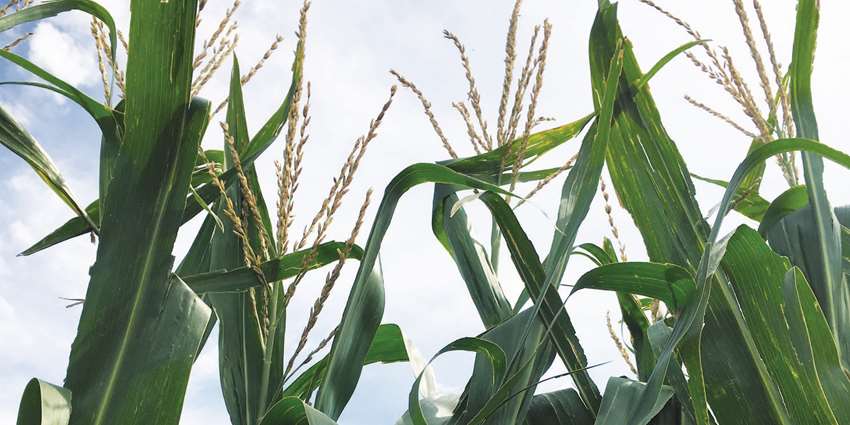Team members of the Ogallala Water Coordinated Agriculture Project (CAP) heard updates on the project’s year two accomplishments and reviewed timelines and goals in anticipation of its next project year, which starts in mid-March, at their recent annual meeting in Manhattan, Kansas.
The multidisciplinary collaborative project, funded by U.S. Department of Agriculture-National Institute of Food and Agriculture (USDA-NIFA), includes more than 40 university researchers and Extension specialists along with their students and post-docs. Colorado State University is the lead for the project and collaborating universities are Kansas State University (KSU), University of Nebraska at Lincoln (UNL), New Mexico State University, Oklahoma State University, Texas A&M University, West Texas University and Texas Tech University (TTU). The USDA Agricultural Research Service (ARS) also participates in the project.
According to Dr. Dana Porter, Texas A&M Department of Biological and Agricultural Engineering associate department head and Texas A&M AgriLife Extension Service agricultural engineering specialist, the first morning’s update of year two accomplishments for each task, was “energetic and well received.”

With the team past the initial phase of getting to know each other and hiring graduate students and postdocs, several team members commented that they were pleasantly surprised to learn more about the project’s extensive activities underway.
In summarizing some of the achievements Porter, who is a member of the project’s leadership team, said the hydrologic and economic modeling groups have made some significant advances, especially with the integration of the Soil and Water Assessment Tool (SWAT), Decision Support System for Agrotechnology Transfer (DSSAT) and MODFLOW models.
“They have proposed some current and ‘what-if’ scenarios to evaluate the effects of changes in crop rotations, crop management and irrigation management on the aquifer,” she said. “The models also provide insights into expected crop yields, with implications for economics.”
As part of the project, Porter said, decision support tools, including irrigation scheduling tools and irrigation technologies ,are being improved, evaluated and promoted at the states’ experiment station and demonstration farms, particularly through the UNL’s Testing Ag Performance Solutions program and KSU’s Water Technology Farms program.
Porter said the project's emphasis on integrating research and outreach, using multistate and multiagency field days, forums and irrigation conferences, was well received and appreciated by the external advisory committee and others present.
Ten of OWCAP’s graduate students and postdocs displayed posters of their research throughout the meeting and provided “ignite”-style presentations during the afternoon on the first day.
Dr. Lois Wright Morton, Iowa State University professor emeritus and former director of the Sustainable Corn CAP, provided a keynote talk, “Making Adjustments, Keeping the Energy and Momentum High: Transformative Approaches from Integration.” Morton convened the nine-state, 11-institution partnership to discover, engage, publish and teach strategies that farmers can use throughout the Corn Belt to make corn-based cropping systems more resilient to current and predicted impacts of climate change. During her presentation Morton shared key teamwork and task work strategies critical to maintaining projectwide understanding and momentum.
Morton’s talk led into a panel discussion focused on success in and collaboration with other integrated, multistate, multidisciplinary projects. Panelist Dr. Jim Dobrowolski, national program leader for the water, rangeland and grassland ecosystem programs at USDA-NIFA stressed that project researchers should not wait to communicate their results internally or externally to the project. Dr. Chuck West of TTU, representing USDA-ARS’s Ogallala Aquifer Program (OAP), touched on how the OWCAP team’s relationships with OAP researchers and others are essential to facing the region’s water-related challenges. Panelists Dr. Dan Devlin of KSU, co-lead for the Great Plains Grazing CAP, and Dr. Allen Berthold, project manager for the new Rio Grande CAP, talked about how to foster mutually beneficial exchange in overlapping project areas such as drought preparedness, irrigation scheduling and other areas.
The project’s engaged advisory board offered grounded, specific feedback and encouragement. It would like to see the project continuing its efforts to interact with stakeholders, particularly producers. The board asked the team to focus on how it will integrate and effectively share the wide range of information it is generating through its research.
“If you want adoption (of water use efficient practices), your information needs to be boiled down for use at the farm level,” said OWCAP advisory board member Roric Paulman of Paulman Farms, Sutherland, Nebraska.
Many of the project’s focus areas are highlighted in the November/December 2017 issue of the Colorado Water Institute’s magazine, Colorado Water. Feature articles cover topics ranging from groundwater law and social views on water, to livestock systems, and different research projects underway related to irrigation technologies, soil health and integrated modeling focused on understanding better how the combination of cropping, economic decision making and weather affect aquifer water levels.
You can read the issue online or download the issue as a PDF.
To receive more information about the Ogallala Water CAP, subscribe to its online newsletter at https://www.ogallalawater.org/. The project is also on Facebook, Twitter and YouTube.
The project is funded by the USDA-NIFA under award number 2016-68007-25066, “Sustaining agriculture through adaptive management to preserve the Ogallala Aquifer under a changing climate.”

